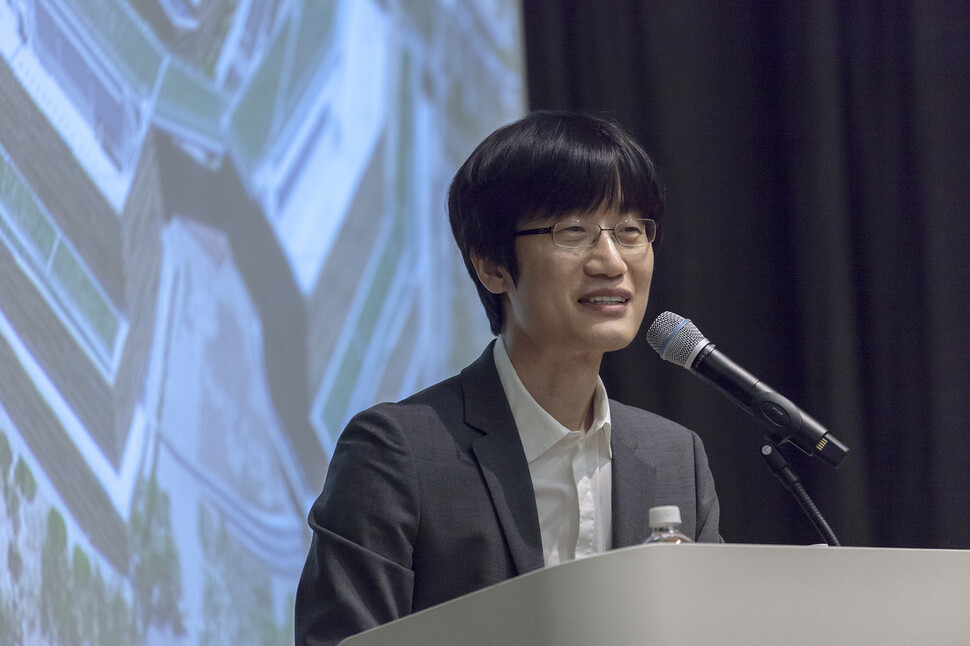hankyoreh
Links to other country sites 다른 나라 사이트 링크
Naver board chairman Lee Hae-jin: "Urgency was the secret of Line's success"

In a press conference held at Naver's "GAK" Data Center in Chuncheon, Gangwon Province, Lee Hae-jin, chairman of the board and founder of Naver, told reporters about the powerful emotions he felt when he watched on TV the ringing the opening bell for Line Corp.'s initial public offering (IPO) at the New York Stock Exchange. Lee and Chief Globalization Officer (CGO) Shin Jung-ho created the Line messaging service and carried it on to great success. Lee is concurrently chairman of Line Corp.
Naver's Japanese subsidiary, Line Corp., debuted on the New York Stock Exchange on July 15 and on the Tokyo Exchange on the 14th. The per-share stock price hit US$41.58 in New York and 4,345 yen in Tokyo on its first day, surging 27 percent and 32 percent respectively over the IPO prices of US$32.84 and 3,300 yen. Line Corp. expected to raise about 6.5 trillion Korean won (US$5.49 billion) but went far beyond that to 10 trillion won. This was the first time for an overseas subsidiary of a South Korean company to go public in both New York and Tokyo at the same time. The IPO has secured a total of about 1.5 trillion won in capital for Line Corp.
Lee said, "This is the first time we've had some capital leeway since we founded Line. This gives us a big boost. We'll use it to invest in developing new technology." He added that the company would strengthen its own technology as well as investing in startups and would look into mergers and acquisitions. "While continuing to defend our leadership in markets where Line already dominates, we also recognize the importance of developing new technologies and expanding into new business areas in order to compete in North American, European, and other markets where such messaging services as America's WhatsApp and China's WeChat are strongly positioned."

Lee says that urgency was the secret that led to Line's success, explaining that an urgent need to expand overseas because the South Korean market is too small to survive in was the driving force that led Line Corp. to go public. He said he was inspired to develop the Line messaging service when he was at his company's Japanese subsidiary during the time of the Tohoku earthquake. A Naver employee who was staying there at the same time explained the situation: "We would get down under our desks every time there was an aftershock. We knew that if we died at home, it might be hard for anyone even to find out about it, so we just stayed at the office, eating and sleeping there as we worked on the messaging app."
Lee says, "I'm still afraid of those huge American Internet businesses, like YouTube in video services, Facebook in social networking, Instagram in photo-sharing, and so on. Every year they record sales of tens of trillions of Korean won with profits also in the trillions. Whenever I think about how we can survive in competition with them, I get nervous and worried. They say Naver is a dinosaur — compare it to Google. Just yesterday morning, I was startled to see a news article about the Pokémon Go craze."
When asked to tell about his business vision and philosophy, Lee, who wears multiple hats as founder and chairman of both Naver and Line Corp., bluntly replied, "I don't have anything like that. Having a strong vision for the future sounds great when you're telling someone about it, but it proves to be a stumbling block when you need to move on to something else or adapt to changes. If you ask me what Naver or Line Corp. will look like three years or five years down the line, I have nothing to say. The same goes for my philosophy of business management."
Lee also had some bitter words to say about Google's request to take its map data out of the country. "A corporation that is on the up and up should pay taxes on its earnings within a country to that country, and it should be open and transparent about where it keeps data on its users and how it uses that data. We're not saying they should stop providing their service here but that they should keep the servers in country. With Google's technology, keeping servers here in Korea is not a problem at all. How can a corporation that's not doing what it's supposed to do ask to have the laws changed? Do you think the government and the media would stand still for it if Naver tried that?"
By Kim Jae-seob, staff reporter
Please direct questions or comments to [english@hani.co.kr]

Editorial・opinion
![[Editorial] Does Yoon think the Korean public is wrong? [Editorial] Does Yoon think the Korean public is wrong?](https://flexible.img.hani.co.kr/flexible/normal/500/300/imgdb/original/2024/0417/8517133419684774.jpg) [Editorial] Does Yoon think the Korean public is wrong?
[Editorial] Does Yoon think the Korean public is wrong?![[Editorial] As it bolsters its alliance with US, Japan must be accountable for past [Editorial] As it bolsters its alliance with US, Japan must be accountable for past](https://flexible.img.hani.co.kr/flexible/normal/500/300/imgdb/original/2024/0417/6817133413968321.jpg) [Editorial] As it bolsters its alliance with US, Japan must be accountable for past
[Editorial] As it bolsters its alliance with US, Japan must be accountable for past- [Guest essay] Amending the Constitution is Yoon’s key to leaving office in public’s good graces
- [Editorial] 10 years on, lessons of Sewol tragedy must never be forgotten
- [Column] A death blow to Korea’s prosecutor politics
- [Correspondent’s column] The US and the end of Japanese pacifism
- [Guest essay] How Korea turned its trainee doctors into monsters
- [Guest essay] As someone who helped forge Seoul-Moscow ties, their status today troubles me
- [Editorial] Koreans sent a loud and clear message to Yoon
- [Column] In Korea’s midterm elections, it’s time for accountability
Most viewed articles
- 1[Column] The clock is ticking for Korea’s first lady
- 2Samsung barricades office as unionized workers strike for better conditions
- 3[Editorial] When the choice is kids or career, Korea will never overcome birth rate woes
- 4[News analysis] After elections, prosecutorial reform will likely make legislative agenda
- 5Why Israel isn’t hitting Iran with immediate retaliation
- 6S. Korea, Japan reaffirm commitment to strengthening trilateral ties with US
- 7[Editorial] Does Yoon think the Korean public is wrong?
- 8[Guest essay] How Korea turned its trainee doctors into monsters
- 9[Editorial] 10 years on, lessons of Sewol tragedy must never be forgotten
- 10Strong dollar isn’t all that’s pushing won exchange rate into to 1,400 range